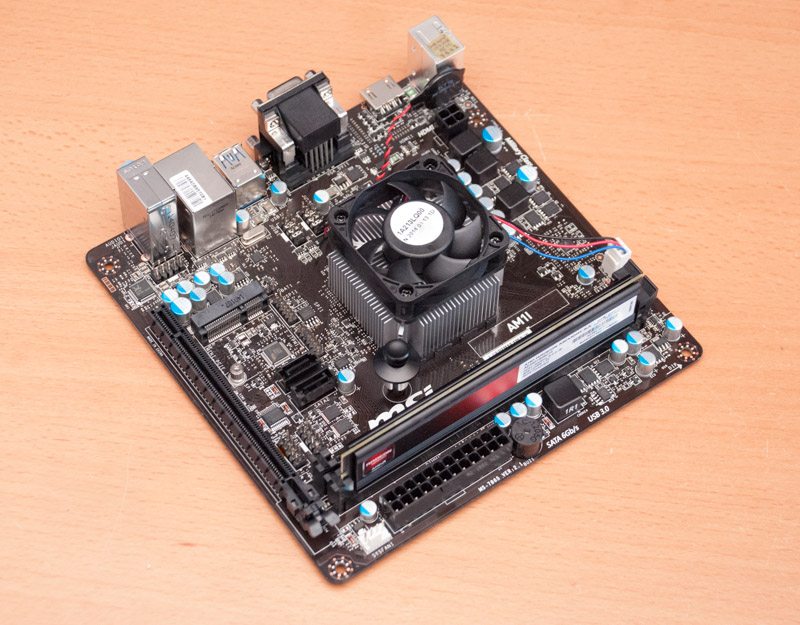AMD Kabini AM1 Athlon 5350 APU (FS1b) Review
Ryan Martin / 11 years ago
Test Systems and Procedures

The AM1 Test System
Test Systems
AMD FM2(+) Test System
- Motherboard – Gigabyte G1 Sniper A88X FM2+
- Processor – A10-7850K, A10-7700K, A8-7600, A10-6800K, A10-6790K and A8-6500T all with Turbo Enabled
- RAM – AMD Performance Series Radeon Memory, 2 x 4GB DDR3-1866 with 9-10-9-27 (CL9) timings
- Graphics Card – None, integrated graphics only.
- CPU Cooler – Corsair H100i with Quiet Fan Profile and Noctua NT-H1 Thermal Paste
- Power Supply – Corsair HX1050W
- Main Storage Drive – Kingston HyperX 240GB SSD over SATA III interface
- Chassis – Lian Li T60 Test Bench
- Displays – Dell U2711 Ultra Sharp
- Operating System – Windows 7 Ultimate 64 Bit
AMD AM1 (FS1b) Test System
- Motherboard – MSI AM1I
- Processor – AMD Athlon 5350
- RAM – AMD Entertainment Series Radeon Memory, 1 x 4GB DDR3-1600 with 9-9-9-28 (CL9) timings
- Graphics Card – None, integrated graphics only.
- CPU Cooler – Stock 1A213LQ00 AMD-provided CPU cooler
- Power Supply – Be Quiet Straight Power 400W
- Main Storage Drive – Kingston HyperX 240GB SSD over SATA III interface, Patriot WildFire 120GB SSD for storage testing, Kingston 64GB HyperX USB 3.0 for USB testing
- Chassis – Lian Li T60 Test Bench
- Displays – Dell U2711 Ultra Sharp
- Operating System – Windows 7 Ultimate 64 Bit
Intel LGA 1150 Test System
- Motherboard – MSI Z87I-Gaming
- Processor – Intel Core i3 4330 (Turbo not supported).
- RAM – AMD Performance Series Radeon Memory, 2 x 4GB DDR3-1866 with 9-10-9-27 (CL9) timings
- Graphics Card – None, integrated graphics only.
- CPU Cooler – Corsair H100i with Quiet Fan Profile and Noctua NT-H1 Thermal Paste
- Power Supply – Corsair HX1050W
- Main Storage Drive – Kingston HyperX 240GB SSD over SATA III interface
- Chassis – Lian Li T60 Test Bench
- Displays – Dell U2711 Ultra Sharp
- Operating System – Windows 7 Ultimate 64 Bit
We would like to thank Gigabyte, MSI, Intel, AMD, Corsair, Kingston, Lian Li, Noctua and all our other partners who supplied us with test system equipment and hardware. Their generosity makes our testing possible and without them we wouldn’t be able to produce the reviews we do, so thank you!
Test Procedures
To conduct this review we have a huge battery of tests, benchmarks and games to battle through. Below we have listed each benchmark and any associated details about how we run the test, how long for (if applicable) and any settings that may be helpful to know.
CPU Tests
- Cinebench R15 – multi threaded, single threaded and Open GL tests.
- WPrime – a 32 million Pi calculation.
- AIDA 64 Engineer – CPU and FPU tests: Queen, Zlib, AES, Hash, VP8, Julia, Mandel and SinJulia.
System Benchmarks
- PCMark 8 – the Home and Work presets with Open CL acceleration enabled.
- 3DMark11: Performance preset.
- 3DMark (2013): Firestrike preset.
GPU and CPU Open CL Benchmarks
- Basemark Open CL – Basic hardware optimisation running the full suite of tests on the GPU part only.
- Compubench CL 1.1.3 – running only the Graphics: Raytrace and Vision: Optical Flow tests on GPU.
- Luxmark – Open CL computation running on the CPU, GPU and GPU/CPU combined hardware.
Memory Benchmarks
- AIDA64 – Memory read, write, copy and latency tests.
Productivity
- x264 HD Benchmark 5.0 – one run and two passes using the default settings.
- Handbrake – conversion of a short 90 second 1080p video file from MP4 to MKV format.
- WinRAR – using the built in benchmark.
- JPEG Decoder – AMD’s provided JPEG decoder benchmark that is run using the standard Windows JPEG decoder and AMD’s new HSA decoder.
- Libre Office – spreadsheet computation and calculation performance.
- TrueCrypt – default settings on the build in benchmark
Gaming
- Battlefield 4 – low preset at 720p (1280 x 720). Measured using fraps and a 2 minute sequence of the game in the middle of the first campaign mission. Replayed with as much duplication as possible to ensure accurate results.
- Tomb Raider – normal preset at 720p, v-sync off, motion blur and screen effects on using the built in benchmark.
- Sleeping Dogs – normal preset at 720p using built in benchmark.
- Bioshock Infinite – medium preset at 720p using the built in benchmark.
- Batman Arkham Origins – normal geometry, everything else off. 720p using the built in benchmark.
- Metro Last Light – Medium preset, AF4X and low motion blur at 720p using the built in benchmark.
- Guacamelee Gold Edition – Maximum settings, AA, no V-Sync at 1080p (1920 x 1080)
- Tales from Space: Mutant Blobs Attack, AA, CPU High and no V-Sync at 1080p
Power and Thermals
- Power consumption – total system power draw measured with the system in an idle desktop state, with a CPU load state, GPU load state and CPU+GPU combined load state. Load states were all provided by the AIDA 64 Engineer system stability test.
- Thermals – temperatures as recorded by CPUID-HW Monitor and AIDA64. Note that the AMD temperature sensors function strangely so results should be taken as a rough guide not as strictly accurate. The load and idle temperatures are for the APU packages as a whole since the GPU parts did not have accurate temperature sensors. The temperatures were measured after a 5 minute APU AIDA 64 system stability load test.
Disk Performance
- AIDA64 Random Read and Linear Read tests for both USB 3.0 disk performance and SATA III disk performance. We used two empty drives for each of the tests. The Kingston HyperX 64GB USB 3.0 flash drive for the USB 3.0 test and the Patriot Wildfire 120GB SATA III SSD for the SATA III test. Both drives are freshly formatted before each of the tests for maximum performance.



















